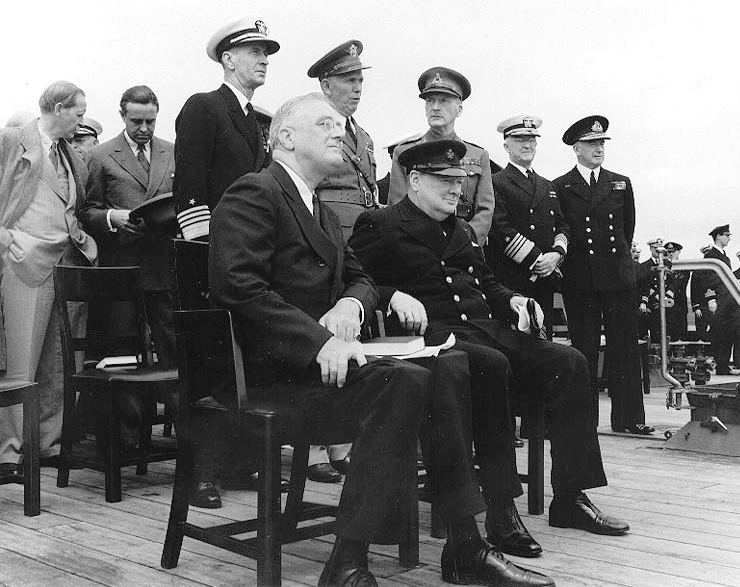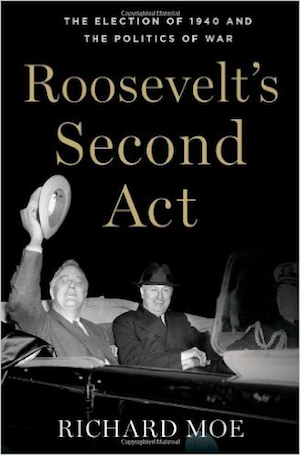This Is the 75th Anniversary of FDR’s Third Term

Roosevelt and Winston Churchill aboard HMS Prince of Wales for 1941 Atlantic Charter meeting. Wikipedia
On November 5, 1940, seventy-five years ago, Franklin Delano Roosevelt was elected to a third term as president, the first and likely the last chief executive ever to do so. Despite some who thought otherwise it was not inevitable that he would run nor was it inevitable that he would win, but the fact that he did both made it one of the most consequential elections in American history.
 It
gave the nation a proven leader of extraordinary talent to lead us through
World War Two, it pierced the veil of America’s isolationism for all time, it
planted the seeds of the national security state that we have become, and it
changed forever the way the American people would view the presidency and those
who seek the office.
It
gave the nation a proven leader of extraordinary talent to lead us through
World War Two, it pierced the veil of America’s isolationism for all time, it
planted the seeds of the national security state that we have become, and it
changed forever the way the American people would view the presidency and those
who seek the office.
Roosevelt had long planned to retire to his beloved Hyde Park when his second term ended in January 1941. He had designed and begun to build a presidential library where he could write his memoirs and play the role of elder statesman. Needing to replenish his finances, he had signed a lucrative contract with Colliers magazine to write regular articles. He was tired, broke, and the New Deal had run its course. His place in history, he believed, was assured. As much as he loved being president, it was time to go home.
The war in Europe, however, changed all that. On May 10, 1940, two months before the Democrat convention convened in Chicago, Adolf Hitler unleashed the new military art of blitzkrieg and swept through the Low Countries and France; by the end of June, Germany had conquered virtually all of continental Europe. Only Great Britain remained in his path, but it was widely believed that its days too were numbered.
FDR was convinced that if France and Britain fell, the war would inevitably come to America. Despite rampant isolationism in the country he had persuaded Congress to amend the Neutrality Act and its arms embargo the year before and made it his top priority to get those nations everything they needed “short of war” to stop Hitler.
But in the end he couldn’t find another Democrat who would support his foreign and domestic policies and who could be elected; he pleaded with Secretary of State Cordell Hull to run almost to the end, but without success. Concluding finally that he was best qualified to steer the country through this crisis, Roosevelt allowed himself to be “drafted” by his party, which is to say he decided to run. He made the decision almost entirely alone, and he didn’t make it until the eve of the Democratic convention; it was quintessential Roosevelt.
Although he was the consummate politician doing everything he could to win a tight and hard-fought race against the charismatic Republican nominee, Wendell Willkie, the president never forgot why he was running: he was preparing America for the war he knew was coming and he was buying time by helping Britain survive. In August 1940, less than three months before the election, he took two huge political risks: he supported the first peacetime draft in American history and, without seeking congressional approval, he sent fifty aging but desperately needed destroyers to Britain in exchange for naval bases in the western hemisphere, effectively ending America’s neutrality.
When Willkie accused FDR of leading the country into war, the polls tightened and on election night FDR thought he would lose. But he won, and he used his victory as a mandate to persuade Congress to enact Lend-Lease, which gave the president extraordinary powers to send military aid to America’s allies. His opponents said he was becoming a dictator.
The combination of these actions and others that followed in World War II led directly to changes in the presidency itself, and especially to the tools available to the president in conducting foreign policy. Until FDR made Harry Hopkins his de facto national security advisor in 1941, he had no White House staff to assist him, but eventually a formal National Security Council would be created. Roosevelt had no formal intelligence apparatus on which to rely; his information from abroad was almost entirely ad hoc, not infrequently provided by former classmates and social acquaintances returning from Europe. The president today has the CIA, the NSA and a complex of other intelligence organizations too numerous and complicated for most people to understand.
The leadership Roosevelt exhibited in 1940 and early 1941, redefining and employing the full powers of his office, succeeded in ending the isolationism that had dominated the country’s foreign policy since the earliest days of the republic. Thereafter the United States would be seriously – and permanently -- engaged in the affairs of the world. The neo-isolationists in the Congress today are but a faint echo of those who sought to thwart Roosevelt’s efforts to aid Britain.
After the 1940 election the American electorate would view the presidency differently, using expanded criteria in selecting its presidents. The question that year was which candidate was most qualified and competent to protect the American people, the most fundamental responsibility of the office; post-election polls showed that voters answered it decisively in FDR’s favor.
The most immediate result of the 1940 election, of course, was the extraordinary skill that Franklin Roosevelt brought to aiding Britain and to leading the Allied effort during the Second World War. It made a monumental difference, arguably the critical difference. Elections matter and this one matters still, three quarters of a century later, for its profound effect in shaping the nation we have become and its role in the world.